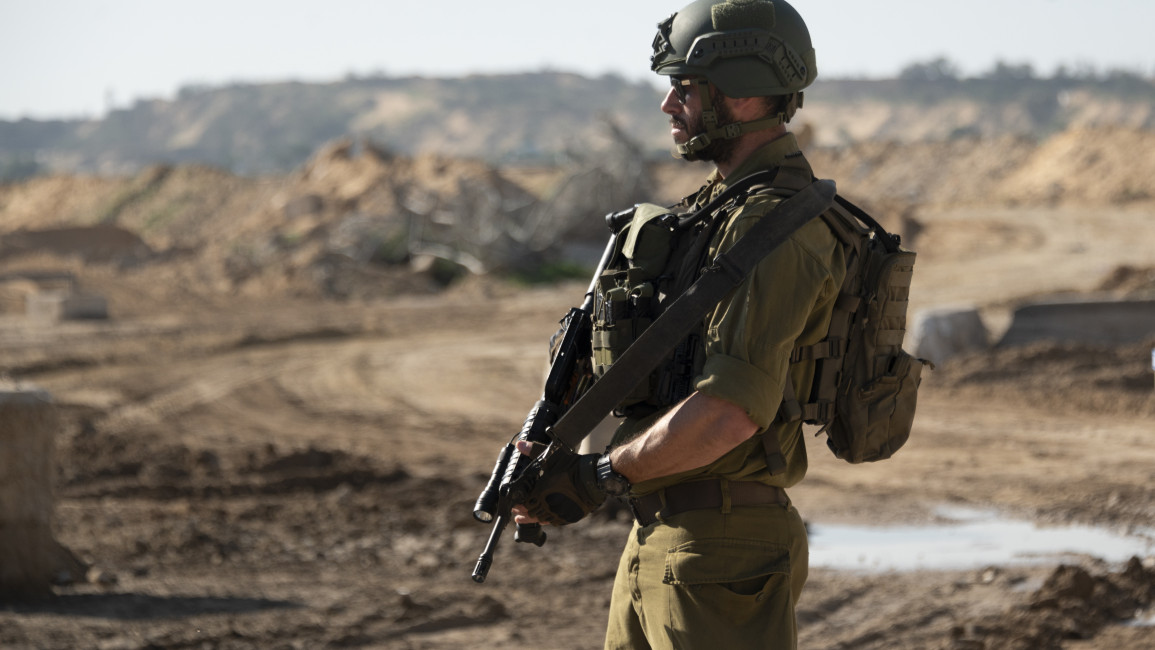Israeli army 'investigating' Gaza law breaches, soldiers firing at hostages
The Israeli army has begun an investigation into whether it broke international law during its offensive in Gaza, Haaretz reported on Tuesday.
The army was reportedly investigating "dozens of incidents" which took place during its recent war on Gaza, including the killing of civilians and apparent blunders related to Israeli soldiers deaths.
Investigators were appointed by the Israeli army chief of staff's headquarters to look into "serious cases of harm to individuals and property".
Previous investigations led by the Israeli army were dismissed as shams by human rights groups, which had documented systemic violations of international law by Israeli authorities in their treatment of Palestinians.
Lawyer Tareq Shrourou from UK-based charity Lawyers for Palestinian Human Rights (LPHR) told The New Arab that the purported investigation will have "no impact on recalibrating Israel's conduct of hostilities in Gaza".
"LPHR has closely monitored Israel's military investigation process for nearly a decade and we concur with Israeli and Palestinian human rights organisations that have described it as a 'whitewashing' exercise which perpetuates impunity and recurrent violations," Shrourou said.
Meanwhile, UN human rights lawyer Francesca Albanese, the UN special rapporteur on the Palestinian territories, said last month that "Israel has done a number of things that are highly illegal, highly unlawful".
Over 27,000 Palestinians have been killed since the start of Israel's onslaught in October, alongside the destruction of hospitals, schools, mosques, and universities.
Recent investigations by international media and human rights watchdogs also showed the desecration of cemeteries and Israeli troops looting Palestinian homes in Gaza.
In Gaza, Israeli forces carried out arbitrary arrests of civilians, with survivors reporting abuse and torture faced while they were abducted.
The army's investigations came against the backdrop of the International Court of Justice’s unprecedented ruling in South Africa’s genocide case against Israel last month, in which Israel was ordered to take all steps to prevent death, destruction and genocidal acts against Palestinians, and take swift action to bring humanitarian aid to Gaza.
The army's investigation could also be relevant to an ongoing International Criminal Court's (ICC) investigation into the situation in the occupied Palestinian territories, as the ICC can only proceed with cases if it is determined that the accused state was "unwilling or unable" to carry out its own investigation.
"By conducting purported investigations into specific incidents, Israel can subsequently claim that the ICC lacks jurisdiction in relation to those potential cases, and thereby attempt to effectively shield individuals from criminal responsibility," Shrourou said.
But hundreds of Palestinians have been killed since the ICJ ruling on 26 January, which has led South Africa to accuse Israel of ignoring the court order.
Some of the incidents which will be scrutinised include the deaths of at least 50 civilians and the wounding of hundreds of others during a strike on a refugee camp in north Gaza.
Israeli warplanes struck the densely populated Jabalia refugee camp in an operation aimed at killing Hamas’ Jabalia battalion commander Ibrahim Biari in October which pummelled civilian buildings and Palestinian health officials reported at the time.
Images of the blown-out neighbourhood and Palestinians searching for survivors under the rubble caused global outrage. The Israeli army claimed that the strike took out Hamas command centres and underground tunnels, as well as Biari.
⭕️Footage capturing the aftermath of the devastation at the PRCS headquarters in Jabalia, northern #Gaza, following the occupation forces' incursion approximately 45 days ago, resulting in the destruction of ambulances🚑.
— PRCS (@PalestineRCS) February 5, 2024
📷Filmed by: PRCS volunteer, Yousef Khader pic.twitter.com/5YoTyIUPuY
The investigators will attempt to piece together what happened when three male hostages holding white flags were killed by Israeli troops as well as look into the deaths of 21 soldiers in an explosion in Gaza in January.
They will also look at why the building of the University of Palestine near Gaza City was detonated in a mammoth explosion last month. Footage showed the building rapidly collapsing into huge clouds of smoke and dust.
The Haaretz report noted that such demolitions would have required the approval of the army chief of staff.
While the investigations are expected to take time, one of the conditions set out by the ICJ judges requires Israel to submit a document to the court on its operations in Gaza and detail how officials respond when presented with possible violations of international law.
Israel rarely prosecutes cases of wrongdoing by the army, with rights groups saying that punishments, when given, are rarely serious.
Separately, Israeli media reported on Tuesday that the army was also looking into a specific incident related to the 7 October attacks in which 12 hostages held by Hamas were killed when an Israeli tank fired shells at a home in the Be’eri settlement, east of the Gaza Strip.
Emerging evidence, including the testimonies of survivors and soldiers, indicated that Israel may have been responsible for several deaths on the day.



